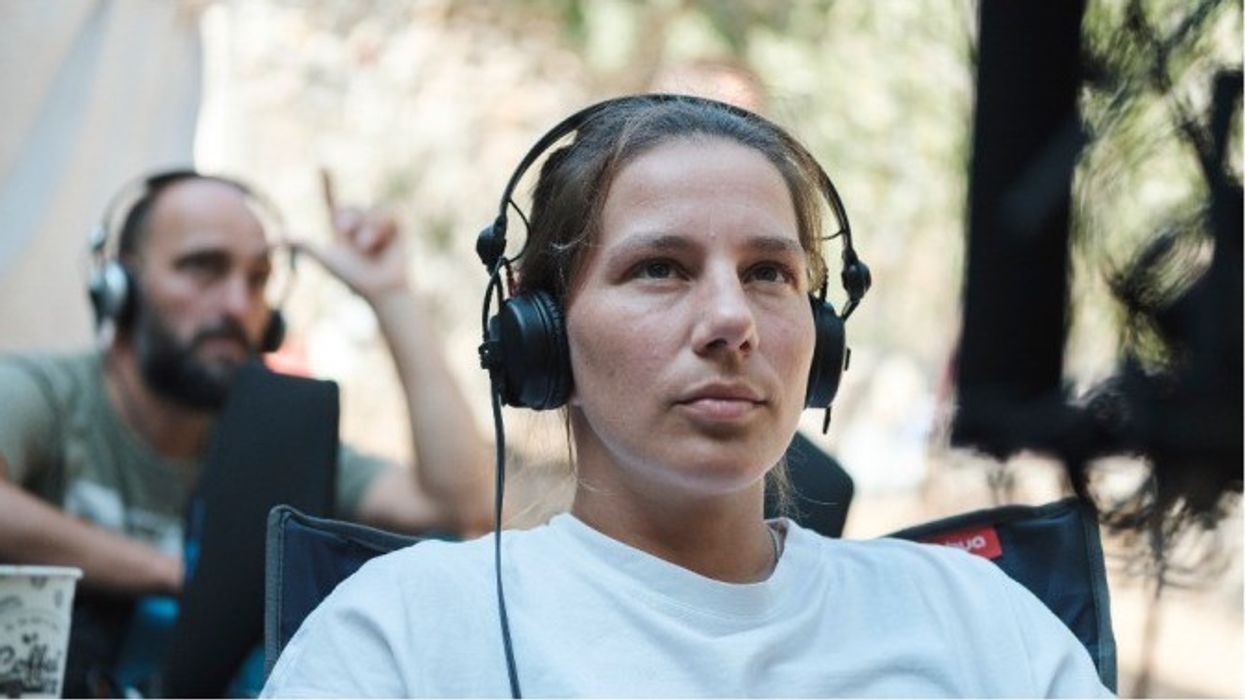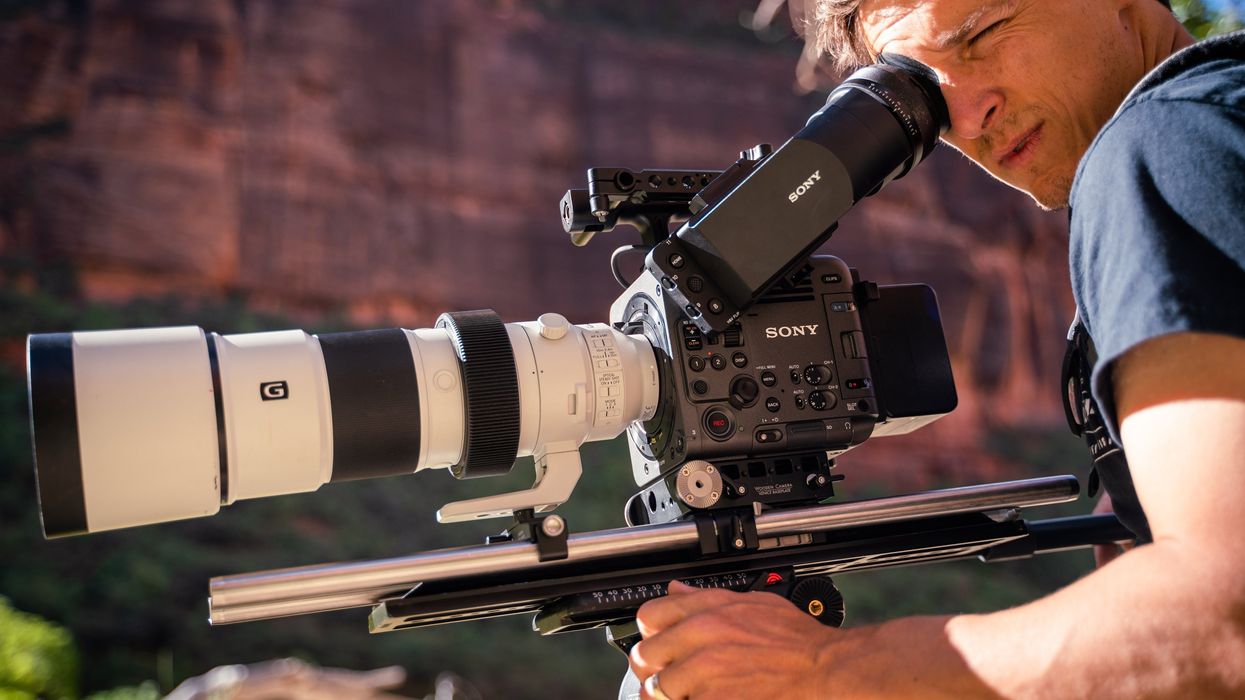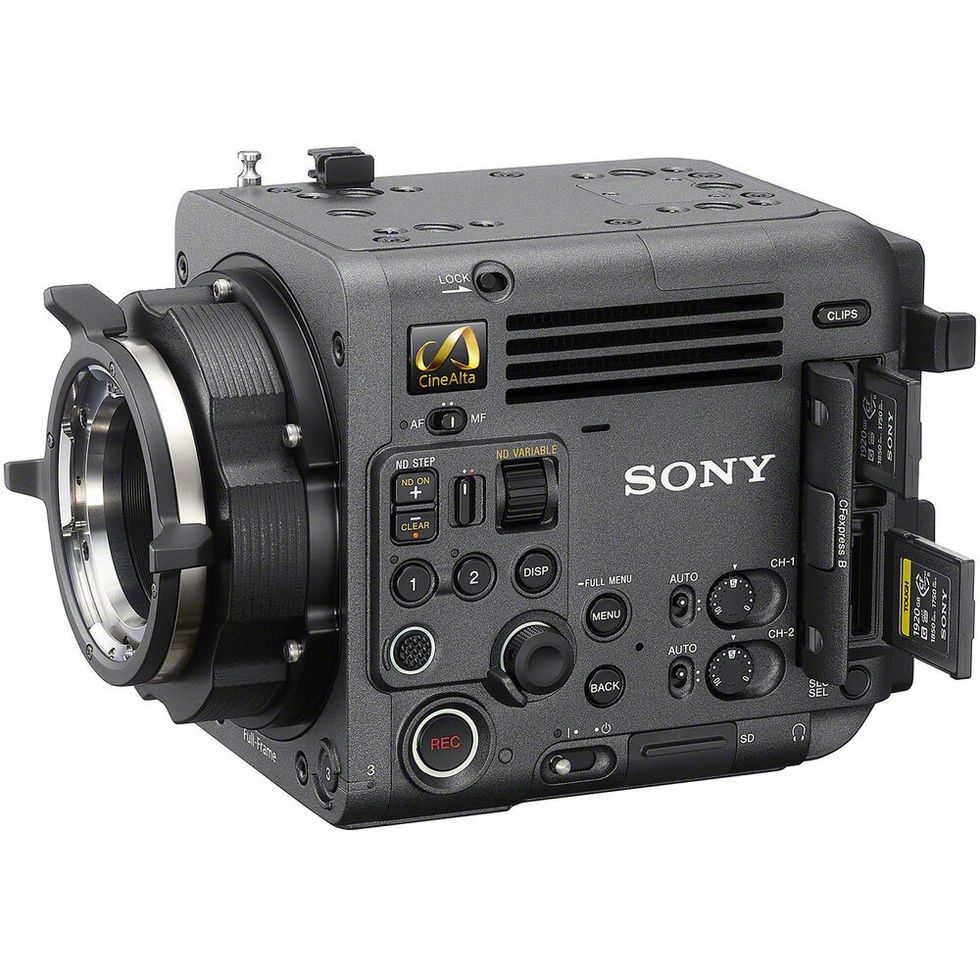"If It's Not Important to Tell, You Should Really Not Be Losing Time and Money Doing It"—Chatting 'Murina' with Antoneta Alamat Kusijanović
Antoneta Alamat Kusijanović is a Cannes winner and an inspiration.

Every so often, a movie comes along that reminds you why you love film. The 2021 Cannes Camera d'Or winner Murina, directed by Antoneta Alamat Kusijanović, is one for me.
Effortless in its tension and storytelling, it speaks to a very specific experience of living under an overbearing parent at a young age, when the world feels at once full of possibility and absolutely closed off. There's so much to admire here—the quiet tenacity of main character Julija (Gracija Filipovic), and how the film carefully unfolds through her eyes only. The beautiful but deadly seaside home where she's trapped, the Adriatic Sea thrumming like a heartbeat under floorboards. All those minuscule moments that feel like a scream for freedom.
It's a film that forces you to lean forward, read between the lines, notice every expression of the characters. You want what Julija wants, and you're willing to go with her, no matter how far.
Murina is coming to theaters this month, and No Film School had the opportunity to speak with Kusijanović ahead of the release. We chat about the challenges of shooting 40 feet underwater, how she used her locations, and her writing process. Dive in!
Editor's note: this interview has been edited for length and clarity.
No Film School: I read that you based the story on life in Croatia, specifically the chauvinism that people face there. Could you talk a little bit about that chauvinism and how you brought that in?
Antoneta Alamat Kusijanović: Yes, of course, so much comes from people and places. For me, that is always where I draw ideas, and that is really perpetuum mobile. That is always what pushes things forward, and it's just the ideas from there never dry up. So I don't really watch so much films in preparation for shooting unless there is something very technical that it's important to understand how we can logistically do it, then I resort to films and No Film School.
But the inspirations for Murina came from being on an island for a very long time as a child. Being completely set free, running around those rocks, and being in between a physical danger and these inner hormones that were luring at this time, at 14, and 15, and 13. It felt like life was so emotionally layered and complex even though we were just kids. And it was real like Shakespearean dramas. So, from that time, I drew all of these delicate emotions, and I started making the short film Into the Blue. And then I met Gracija [Filipovic], who was absolutely amazing.
And she deserved to be on screen, captured forever before she comes fully into adulthood. And I wrote Murina specifically for her, given that, seeing her in those spaces—it's not the same character between Murina and a short film. I don't think that even their family context is the same at all, but the agility and the strength and resilience and desire and turmoil is somehow similar.

Kusijanović: Yes, absolutely. I was looking for a place that is going to feel very suffocating even when we go into wide spaces. So, for me, that sense of entrapment came from finding the places that feel impossible to live in.
And that means rocks, miles of rocks, without any shade, surrounded by beautiful water. But the nature is stark, and it's violent. And at first, it seems as a picture of utopia, but as with every utopia, you stay and linger a little bit, and then you see it's really hell.
And I felt like that character does not need to be framed tight in a sense to feel tight. Even when we break out to the wide shots, and they are just these little silhouettes in a wide space, it feels like, Okay, they are locked in. There's nowhere to go.
And from that architecture, everything that is under the skin inevitably needs to burst to the surface. A small problem becomes a big problem. Small violence becomes nearly a murder. And that's how location, in this case, its natural location, is really helping to build that.

Kusijanović: That is a very good thing you mention because, very often, it can be misinterpreted. What does it mean to have an audience in mind? And in a sense, I always have an audience in mind. I know that someone will watch it. That's what it means.
It doesn't mean I am writing the movie with some specific engineering or certain audience. No. But meaning, if I am writing this arc emotional, where one character is going through a deep and turbulent journey, and it needs to arrive at one point, I need to be aware that those who watch that can follow. And that's what it means, for me, having [an] audience in mind.
It's always asking [the] question, "Is [the] audience experiencing, at any given moment, what I want them to experience in that moment? Do they emotionally follow me?" Not merely if they understand what I'm talking about. Sometimes they don't even need to understand if they follow.
It's actually much better if they understand or feel or both later on. But that, of course, takes the steps. All the little steps make that impact. And that's what it means for me to have those people watching the film in mind.

Kusijanović: Oh, yeah. Absolutely. That's a good conversation starter because those who have missed this as a "violence" are those that really do need this movie.
And the more they talk about the movie, that they haven't felt that the movie is about anything, the more those who are unlike them are going to maybe enlighten them. Hopefully. The movie has been—[it] truly polarized the audience, which is good. When completely liked by everyone, we say in Croatia, we have a saying, "It's not wine, and it's not water." It's something in between. And it's not good to be in between.
I really liked the reactions. I liked that it was affirmed that this is true to our mentality, by those who said, "Nothing happens in this film. This is just a regular family."
And it is impactful for those who said, "This is my mother. This is my father. This is me. This helped me change. This helped me find my resilience. This helps me understand my family. This helps me unlock certain traumas that I had."
Or, "This inspired me to bring my mother to the cinema and tell her, 'Isn't this your life?'" I've heard that before.

Kusijanović: I don't think that we make films with [a] mission, but always we make films from what feels important when faced with death. If it's not important to tell, you should really not be losing time and money doing it.
But also it's such a collective way—it's such a collective art form that to do something that does not feel important faced with death. You're pulling many more people, possibly hundreds to do something not important when faced with death, and that is, losing everybody's time. So there's a lot of, I think, responsibility as a director when choosing projects and bringing people on board. I'm hoping that we are not all doing it just to sell our time.
NFS: I think that's so important. And a lot of people forget that.
Kusijanović: Yes. But also it is very important to remember that it's a privilege to be able to do that, very big privilege.
NFS: Yeah. And I think that comes from, if I've read correctly, your background, your close brushes with death in your work, in your childhood, so I think that's beautiful that you're bringing that into how you approach work as a director, as well.
Kusijanović: Thank you.

Kusijanović: Put a strong dilemma to the character and be true, moment to moment, to their emotional progress.
And it sounds very simple, but it takes me very long time to truly understand the character, to be able to be truthful in such true way. For me, one of the main rules is that plot doesn't move the story. It's always the character that creates the plot. All the decisions come from character and all the conflicts come from impossible choices that character is facing.
NFS: Is that just through process that you come to understand the character? Or do you do writing exercises?
Kusijanović: I always start somewhere from [a] relationship between two people. And then, as the relationship between two people evolves, it asks questions about other elements of that relationship and each character.
And it is a very slow knitting. It's really like creating a web and it's snipping in a 360-way and it's re-knitting and breaking things apart and doing it anew. And that is very laborious because you sometimes feel like, "Oh, I'm going to forget this, and this part is not belonging anymore, and now, if I broke this element of this character, it does not hold the story." But the story always surfaces. The story always existed. You just need to find it.

NFS: I think that's one of the most frustrating parts of writing but also one of the most beautiful parts, because you feel like you're really close, and you just haven't gotten there yet.
Kusijanović: Yes. I remember I had a meeting with some producers recently, and I'm saying, "Okay, this script is going to be done in May." And then, "The script is going to be done in June."
And then I met with them, we had lunch, and I said, "Listen, I just killed the woman." They're like, "What?"
And I'm like, "No, no, no. Don't worry. It's a good thing." They're like, "What?"
I'm like, "Yes, she didn't belong in the story. It was an extra character."
And it is like that, being so much in. To experience that you are living in that world. It's a [family] constellation. It's a constellation, and later it becomes a constellation with your actors, and then with your creative team, and once it becomes the constellation with location and the movement in space. Everybody gives it sweat and tears and blood and laughter and traumas and happiness. And then you make this physical object that is a film, and it really works like witchcraft because other people come to the theater in the dark room and watch it collectively, and they hopefully come out changed.

NFS: I know this is a large question, but can you talk about some of the challenges of this project?
Kusijanović: It was very challenging to shoot this movie because it feels very lean on the surface, right? Because it is just a couple of people in bathing suits. But what that means, technically, is that you cannot mic them. And they're by the water, and you almost need to ADR everything, which means redirecting those people back in the studio once you're done with filming months away from an actual shoot. That is very difficult, finding that core emotion back.
Also, it's very difficult to shoot underwater because, very often, I think that, for many people, underwater shot is just [a] camera underwater, but to create the complex conflicts and scenes of people coming together and going apart underwater takes a lot of planning, and it is physically draining. It is very laborious work to shoot underwater because water really takes out energy from the body. That's why we go and relax by the water. We can't shoot in it.

I feel like I can give advice right now about shooting underwater. And people often ask me, "How did you do it?" because communication is such a problem, and I was actually shooting 10 to 13 meters underwater. You have to check what is that in feet [about 33 to 43 feet]. It's very deep.
I was, of course, doing preparation with my actors underwater. We would dive together, even see the locations so they feel familiar with it because it's scary to be underwater, especially for 45 minutes at a time, as they did, sometimes, in the wetsuits. And then I would rehearse above the water and then, once they dive in, they don't dive out until we shoot the scene because you can really only dive in twice a day, because of the pressure differences. So once you dive under, instead of coming up and down these 10, 15 meters, you actually have to shoot as much as you can. And then you make another six hours.
So how I did it is I took a microphone, actually, and a speaker from synchronized swimming, and I sank it underwater so the actors could hear my directions and a camera could hear my direction. Meanwhile, I was above the water on the boat, and I was able to watch every shot.
So it was great because they could actually only really do what I tell them because they couldn't respond back.

Kusijanović: Yeah, that was great. And that was challenging. I think it was also challenging to shoot in the cave at night. That was a real cave, and it was really at night, and to light that, and for safety, and actually acting in that cave feels pretty real as well. It was very deep. That was one of the most emotionally and physically challenging days.
Working with CGI is also very challenging because you can never really know what will work out. So you have to be always ready to change the strategy and change the shot and adapt them both on set and in post-production.
Okay. Ask me, ask me one more.
NFS: Any other advice in terms of the path that you took? Any advice for filmmakers wanting to get in?
Kusijanović: Yes. I think that they need to really be honest and try not to look [at] what other people are doing and try not to just please the festivals because they're going to always be late.
The moment that the trend is set on a festival, by the time they produce their film, that fast trend is gone. So do not try to lead or follow the trend and do not try to copy others, and do not try to do anything that's not honest and truthful to yourself.
Murina is in theaters July 8.













